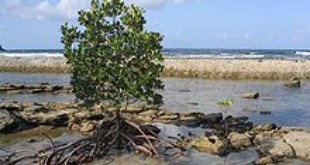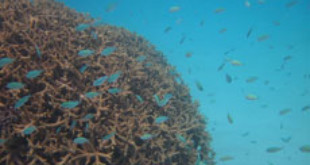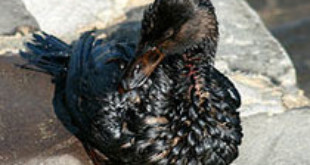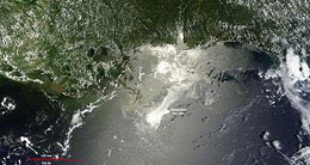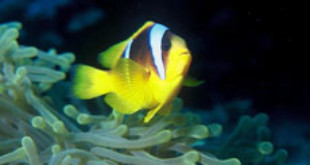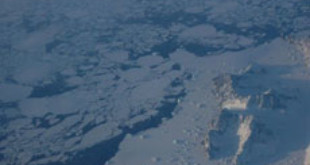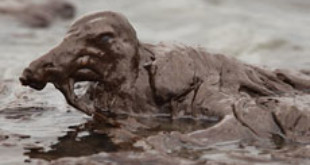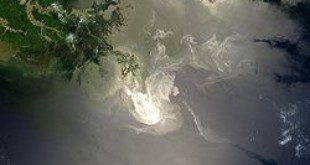A new report by the United Nation Environment Program (UNEP) and the Nature Conservancy has found that mangrove forests are being lost at staggering rates worldwide: since 1980 one fifth of the world”s mangroves have been felled. Mangroves, which grow in saline coastal habitats, are disappearing four times faster than …
July, 2010
-
16 July
Red Sea coral growth ‘to halt by 2070’
A species of coral in the Red Sea could stop growing by 2070 if current warming trends continue, say scientists. A team of US researchers, using 3D technology, said that the rate of growth of Diploastrea heliopara had declined by 30% since 1998. Rising sea surface temperature was already “driving …
-
15 July
Oil hits Louisiana’s largest seabird nesting area
Biologists say oil has smeared at least 300-400 pelicans and hundreds of terns in the largest seabird nesting area along the Louisiana coast — marking a sharp and sudden escalation in wildlife harmed by BP”s Gulf of Mexico oil spill. The finding underscores that official tallies of birds impacted by …
-
15 July
Oil spills raise arsenic levels in the ocean, says new research
Oil spills can increase levels of toxic arsenic in the ocean, creating an additional long-term threat to the marine ecosystem, according to research published today in the journal Water Research. Arsenic is a poisonous chemical element found in minerals and it is present in oil. High levels of arsenic in …
-
7 July
Welcome home Pete Bethune
The Green Party is celebrating news that Pete Bethune is to come home. “Pete Bethune is a brave Kiwi who protected whales when his Government would not and we look forward to his return to NZ,” Dr Russel Norman, Green Party co-leader said today. Pete has been on trial in …
-
7 July
Ocean acidification may make fish foolhardy
Baby fish become confused and reckless in acidified water, a new study shows. This leads to higher death rates and may mean that rising atmospheric carbon dioxide, which causes ocean acidification, will reduce the number of fish in the ocean. “It shows we should be concerned with even minor changes …
-
1 July
Lawsuit Launched to Force BP and Coast Guard to Protect Turtles From Burning Alive
The Center for Biological Diversity and Turtle Island Restoration Network today officially notified BP and the U.S. Coast Guard of their intent to sue to stop the burning alive of endangered sea turtles in the chaotic clean-up efforts in the Gulf of Mexico. The letter is a prerequisite to filing …
June, 2010
-
18 June
Ocean changes may have dire impacts on people
In an article published today in Science magazine, scientists reveal the growing atmospheric concentrations of man-made greenhouse gases are driving irreversible and dramatic changes to the way the ocean functions, with potentially dire impacts for hundreds of millions of people across the planet. The findings of the report, “The impact …
-
9 June
EU ends bluefin tuna season early over depleted stocks
The European Commission is closing the bluefin tuna fishing season early because of depleted stocks, imposing a ban that will take effect on Thursday. The ban covers fishing grounds in the Mediterranean and eastern Atlantic. It affects industrial purse seine fishing, which accounts for more than 70% of the annual …
-
4 June
Turned into unrecognisable monsters by the oil
It looks primeval, like some strange creature emerging from a muck-filled stew. Once, this was a sea bird. Now it has been reduced to a helpless, flightless, oil-coated being, fighting for its life – all thanks to the oil spill. It is impossible to imagine feathers or wings, or the …
-
1 June
Undersea Oil Adrift in Gulf May Create Oxygen ‘Dead Zones’
The world”s most damaging oil spill – now in its 41st continuously gushing day – is creating huge unseen “dead zones” in the Gulf of Mexico, according to oceanologists and toxicologists. They say that if their fears are correct, then the sea”s entire food chain could suffer years of devastation, …
May, 2010
-
25 May
Endangered Status Sought for Bluefin Tuna
Species Already Imperiled by Fishing Now Faces Loss of Gulf Spawning Grounds to Oil Spill The Center for Biological Diversity filed a formal scientific petition today to protect Atlantic bluefin tuna under the Endangered Species Act. Overfishing has erased more than 80 percent of the bluefin tuna in the North …
 Ocean Sentry
Ocean Sentry
